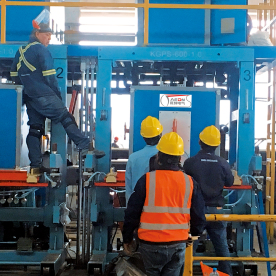[Annealing Machine Applications in Industry]Exploring the Diverse Applications of Annealing Machines in Various Industries: Enhancing Material Properties and Process Efficiency
News 2024-9-30
Annealing is a crucial heat treatment process utilized in various industries to enhance the properties of materials such as metals and glass. One of the key components in this process is the annealing machine, a specialized piece of equipment designed to heat and cool materials in a controlled manner. The applications of annealing machines in industry are diverse, impacting sectors like automotive, aerospace, electronics, and manufacturing. This article delves into the significance of annealing machines, their applications, and the benefits they bring to different industrial processes.
The primary objective of annealing is to alter the physical and sometimes chemical properties of a material to relieve stresses and improve ductility, toughness, and mechanical stability. In metals, for instance, annealing is vital to reduce hardness and make them easier to work with. This process involves heating the material to a specific temperature and holding it there for a designated time before cooling it at a controlled rate. The types of annealing processes can vary widely, including full annealing, stress relief, spheroidizing, and more, each tailored to specific material characteristics and end-use requirements.

Exploring the Diverse Applications of Annealing Machines in Various Industries: Enhancing Material Properties and Process Efficiency

Exploring the Diverse Applications of Annealing Machines in Various Industries: Enhancing Material Properties and Process Efficiency

Exploring the Diverse Applications of Annealing Machines in Various Industries: Enhancing Material Properties and Process Efficiency
In the electronics industry, the applications of annealing machines present unique challenges and opportunities. Thin films and wires made from metals are common in electronic components, and their performance is significantly influenced by their internal structure and properties. Annealing can refine the microstructure of these materials, optimizing electrical conductivity and minimizing defects that could lead to failure in electronic circuits. For example, copper and aluminum wires often undergo annealing to achieve the required balance between conductivity and mechanical strength, thus enhancing overall product performance.
Manufacturing sectors, particularly those involved in the production of stainless steel and other specialized alloys, heavily rely on annealing machines to maintain product quality. The properties of stainless steel, such as corrosion resistance and ductility, are largely affected by the annealing process. By carefully controlling temperature and cooling rates, manufacturers achieve the desired properties that meet specific industry standards and applications.
Moreover, the advancements in technology have led to the development of more efficient annealing machines. Modern annealing lines are equipped with advanced control systems that enable real-time monitoring and adjustments to optimize the annealing process. This has resulted in improved energy efficiency, reduced processing times, and enhanced overall productivity.
In conclusion, the applications of annealing machines in industry are vast, significantly impacting a variety of sectors, including automotive, aerospace, electronics, and general manufacturing. By enhancing the mechanical properties of materials, these machines play a crucial role in ensuring product performance, reliability, and safety. As technology continues to advance, the capabilities and efficiency of annealing machines are likely to improve further, offering even greater benefits to industries worldwide. As industries evolve and demand higher performance materials, the role of annealing machines will become increasingly vital in meeting these challenges.
